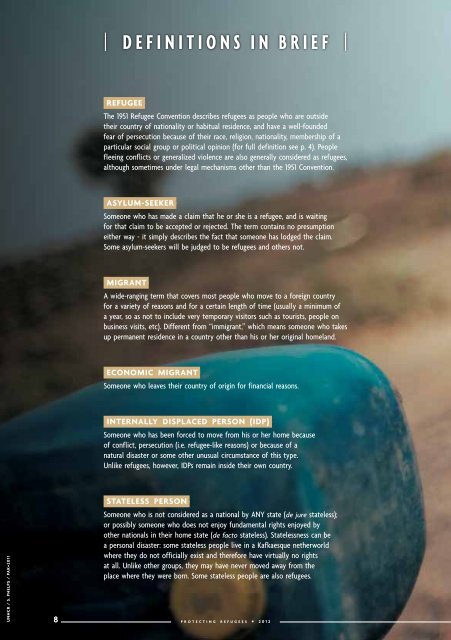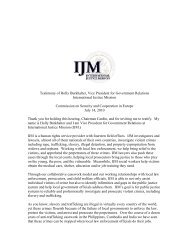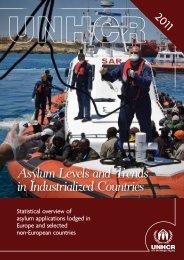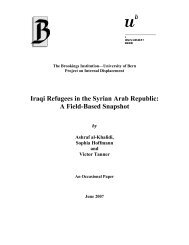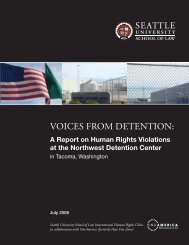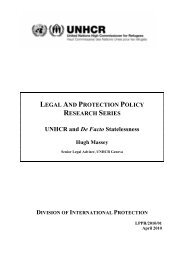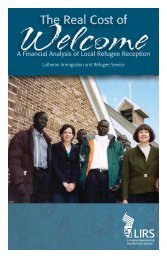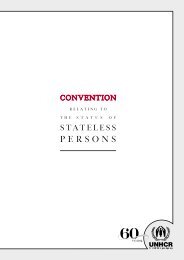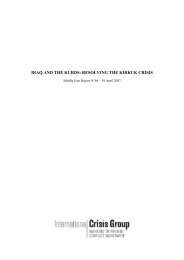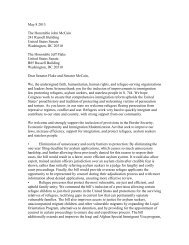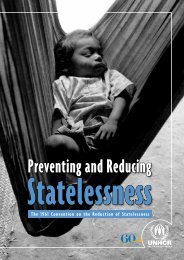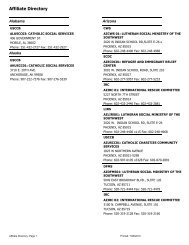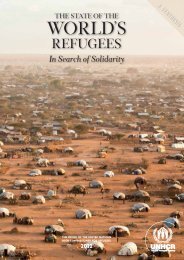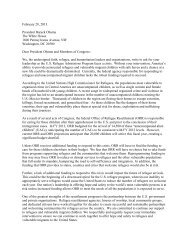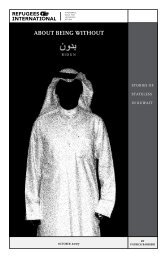& the role of UNhCr
& the role of UNhCr
& the role of UNhCr
You also want an ePaper? Increase the reach of your titles
YUMPU automatically turns print PDFs into web optimized ePapers that Google loves.
Definitions in brief<br />
The 1951 Refugee Convention describes refugees as people who are outside<br />
<strong>the</strong>ir country <strong>of</strong> nationality or habitual residence, and have a well-founded<br />
fear <strong>of</strong> persecution because <strong>of</strong> <strong>the</strong>ir race, religion, nationality, membership <strong>of</strong> a<br />
particular social group or political opinion (for full definition see p. 4). People<br />
fleeing conflicts or generalized violence are also generally considered as refugees,<br />
although sometimes under legal mechanisms o<strong>the</strong>r than <strong>the</strong> 1951 Convention.<br />
Refugee-<br />
Asylum-seeker-<br />
Someone who has made a claim that he or she is a refugee, and is waiting<br />
for that claim to be accepted or rejected. The term contains no presumption<br />
ei<strong>the</strong>r way - it simply describes <strong>the</strong> fact that someone has lodged <strong>the</strong> claim.<br />
Some asylum-seekers will be judged to be refugees and o<strong>the</strong>rs not.<br />
Migrant-<br />
A wide-ranging term that covers most people who move to a foreign country<br />
for a variety <strong>of</strong> reasons and for a certain length <strong>of</strong> time (usually a minimum <strong>of</strong><br />
a year, so as not to include very temporary visitors such as tourists, people on<br />
business visits, etc). Different from “immigrant,” which means someone who takes<br />
up permanent residence in a country o<strong>the</strong>r than his or her original homeland.<br />
Economic migrant-<br />
Someone who leaves <strong>the</strong>ir country <strong>of</strong> origin for financial reasons.<br />
Internally displaced person (IDP)-<br />
Someone who has been forced to move from his or her home because<br />
<strong>of</strong> conflict, persecution (i.e. refugee-like reasons) or because <strong>of</strong> a<br />
natural disaster or some o<strong>the</strong>r unusual circumstance <strong>of</strong> this type.<br />
Unlike refugees, however, IDPs remain inside <strong>the</strong>ir own country.<br />
UNHCR / S. Phelps / PAK•2011<br />
8<br />
Stateless person-<br />
Someone who is not considered as a national by ANY state (de jure stateless);<br />
or possibly someone who does not enjoy fundamental rights enjoyed by<br />
o<strong>the</strong>r nationals in <strong>the</strong>ir home state (de facto stateless). Statelessness can be<br />
a personal disaster: some stateless people live in a Kafkaesque ne<strong>the</strong>rworld<br />
where <strong>the</strong>y do not <strong>of</strong>ficially exist and <strong>the</strong>refore have virtually no rights<br />
at all. Unlike o<strong>the</strong>r groups, <strong>the</strong>y may have never moved away from <strong>the</strong><br />
place where <strong>the</strong>y were born. Some stateless people are also refugees.<br />
p r o t e c t i n g r e f u g e e s • 2 0 1 2


